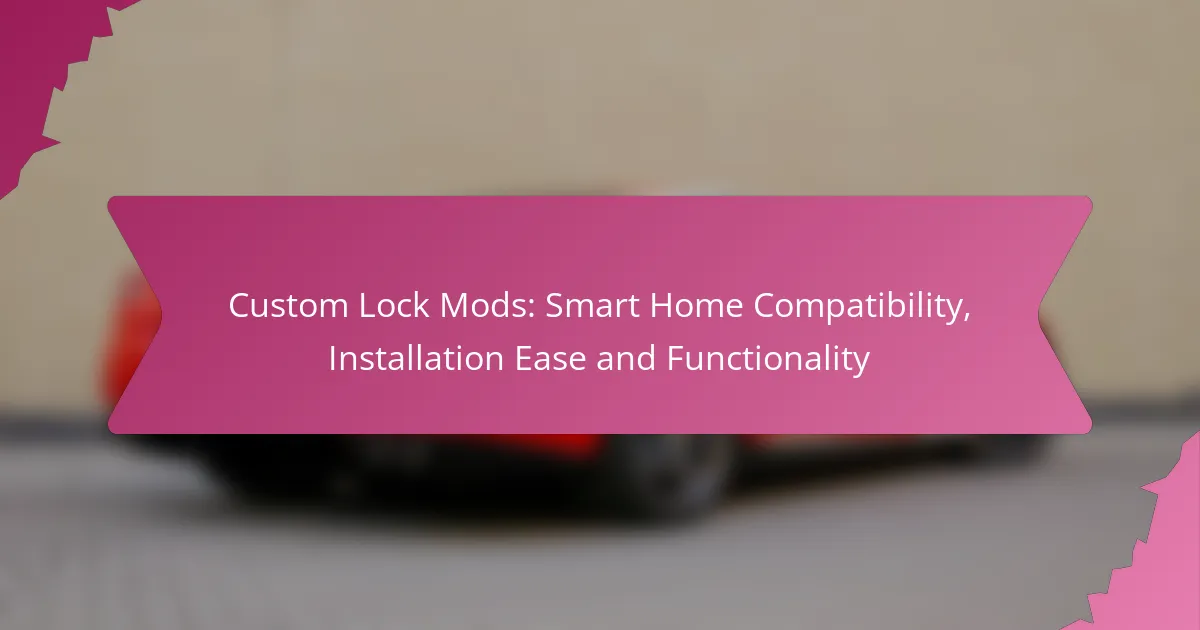Custom lock mods for smart homes provide enhanced security by seamlessly integrating with various platforms, offering features such as remote access and voice assistant compatibility. Their straightforward installation process makes them accessible for both DIY enthusiasts and those seeking professional assistance. With these locks, users can enjoy greater functionality and peace of mind in managing their home security.

What are the best custom lock mods for smart home compatibility?
The best custom lock mods for smart home compatibility enhance your security system by integrating seamlessly with various smart home platforms. These locks typically offer features like remote access, compatibility with voice assistants, and easy installation, making them ideal for modern homes.
August Smart Lock Pro
The August Smart Lock Pro is designed to retrofit existing deadbolts, allowing for easy installation without replacing your entire lock. It connects to Wi-Fi through the August Connect, enabling remote access and control via a smartphone app.
This lock is compatible with major smart home systems, including Apple HomeKit, Amazon Alexa, and Google Assistant, making it a versatile choice for users looking to integrate with their existing setups. Its auto-lock feature and DoorSense technology provide added convenience and security.
Yale Assure Lock SL
The Yale Assure Lock SL is a sleek, key-free smart lock that offers a touchscreen keypad for entry. It can be easily installed on most standard doors and is compatible with various smart home systems, including Z-Wave and Zigbee.
This lock allows users to create unique entry codes for family and friends, enhancing convenience without compromising security. Additionally, it integrates well with smart home platforms, allowing for remote access and monitoring.
Schlage Encode Smart WiFi Deadbolt
The Schlage Encode Smart WiFi Deadbolt features built-in Wi-Fi, eliminating the need for additional hubs or devices. This lock allows for direct connection to your home network, enabling remote access and control through the Schlage Home app.
It supports up to 100 access codes, making it suitable for larger households or rental properties. The lock is also compatible with Amazon Alexa for voice control, providing an additional layer of convenience for users.
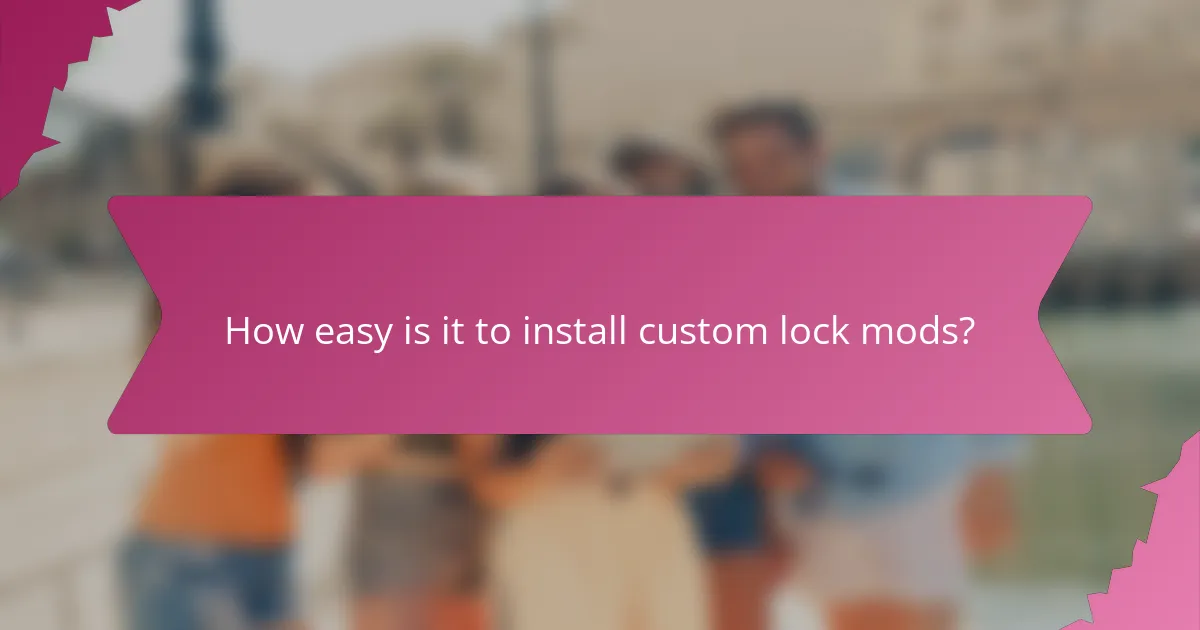
How easy is it to install custom lock mods?
Installing custom lock mods can be straightforward, often requiring minimal tools and time. Many options are designed for easy integration with existing smart home systems, making them accessible for both DIY enthusiasts and those who prefer professional help.
Simple DIY installation
Many custom lock mods are designed for simple DIY installation, allowing homeowners to upgrade their locks without extensive technical knowledge. Typically, the process involves removing the existing lock and replacing it with the new mod, which usually takes less than an hour.
Before starting, ensure you have the necessary tools, such as a screwdriver and a drill. Always follow the manufacturer’s instructions closely to avoid common pitfalls, such as misalignment or improper wiring.
Professional installation options
If DIY installation seems daunting, hiring a professional can ensure a seamless setup. Professional installers are familiar with various lock systems and can often complete the installation in under an hour, depending on the complexity of the mod.
Costs for professional installation can vary widely, typically ranging from $50 to $150, depending on the region and the specific lock system. It’s advisable to get quotes from multiple service providers to find the best deal. Always check reviews and credentials to ensure quality service.
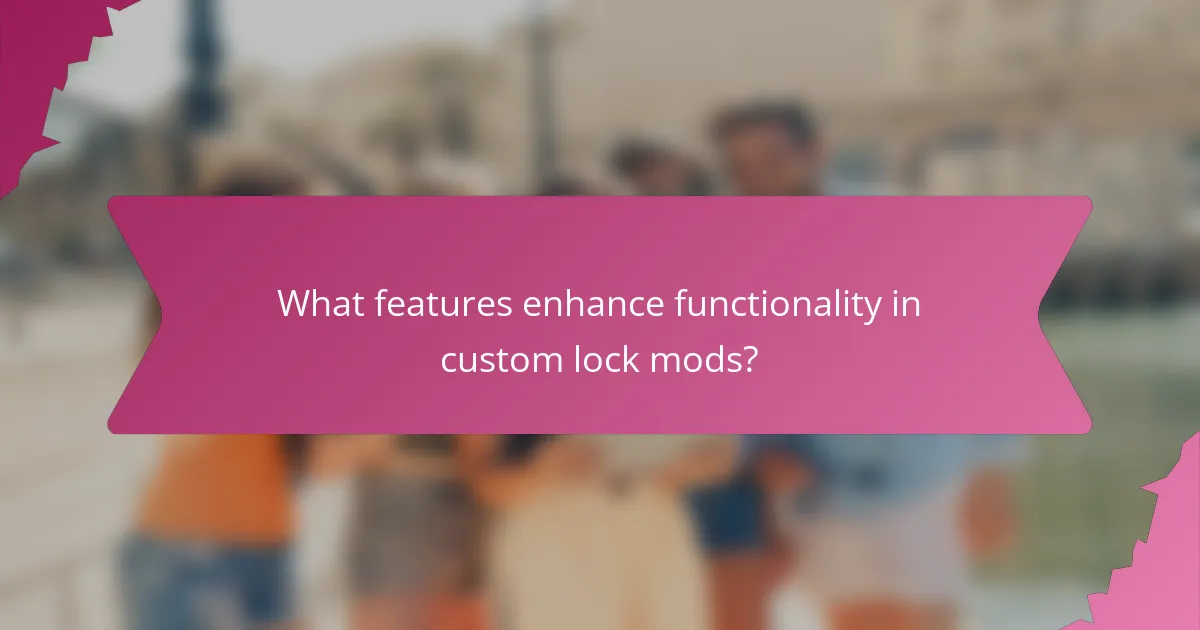
What features enhance functionality in custom lock mods?
Custom lock mods enhance functionality through features like remote access control and voice assistant integration. These capabilities allow users to manage their locks conveniently and securely, providing peace of mind and flexibility in home security.
Remote access control
Remote access control enables users to lock or unlock their doors from anywhere using a smartphone app. This feature is particularly useful for granting access to guests or service providers without needing to be physically present.
When considering remote access, look for locks that offer secure encryption and user-friendly interfaces. Some models may allow for temporary access codes, which can be set to expire after a certain time, adding an extra layer of security.
Voice assistant integration
Voice assistant integration allows users to control their locks using voice commands through devices like Amazon Alexa or Google Assistant. This hands-free functionality is convenient for those who may have their hands full or prefer quick access without using a mobile device.
To take advantage of this feature, ensure that your custom lock mod is compatible with your chosen voice assistant. Check for specific commands and capabilities, as some locks may offer additional features like status updates or alerts through voice prompts.
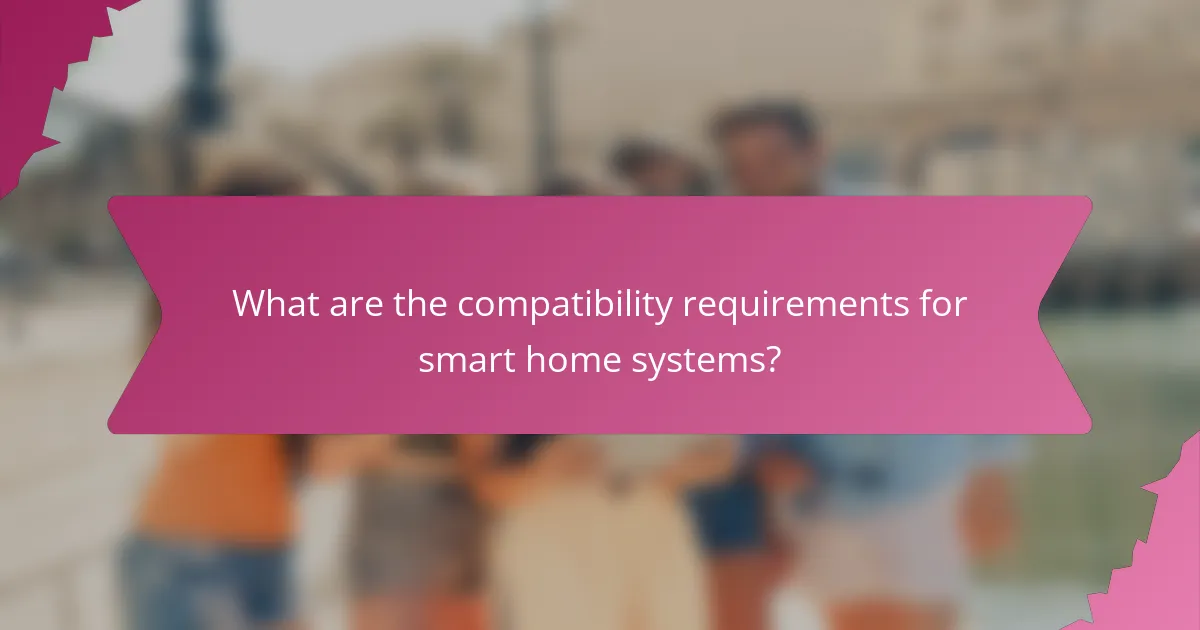
What are the compatibility requirements for smart home systems?
To ensure seamless integration, custom lock mods must be compatible with existing smart home systems, which typically rely on specific communication protocols and connectivity options. Users should verify that their smart lock supports the required standards for their smart home ecosystem.
Wi-Fi connectivity
Wi-Fi connectivity is essential for many smart home devices, including custom lock mods. A lock that connects via Wi-Fi allows for remote access and monitoring through a smartphone app, enabling users to control their locks from anywhere with internet access.
When selecting a smart lock, check for compatibility with your home Wi-Fi network, including support for both 2.4 GHz and 5 GHz bands. Some locks may require a dedicated hub to connect to your Wi-Fi, which can add complexity to the installation.
Bluetooth support
Bluetooth support is another important feature for custom lock mods, allowing for direct communication with smartphones or tablets. This connection is typically used for local access, enabling users to unlock their doors without needing an internet connection.
Consider the range of the Bluetooth connection, which is usually effective within a few meters. Some locks offer Bluetooth as a backup option, ensuring functionality even when Wi-Fi is unavailable. Ensure your smart lock can pair easily with your devices to avoid connectivity issues.
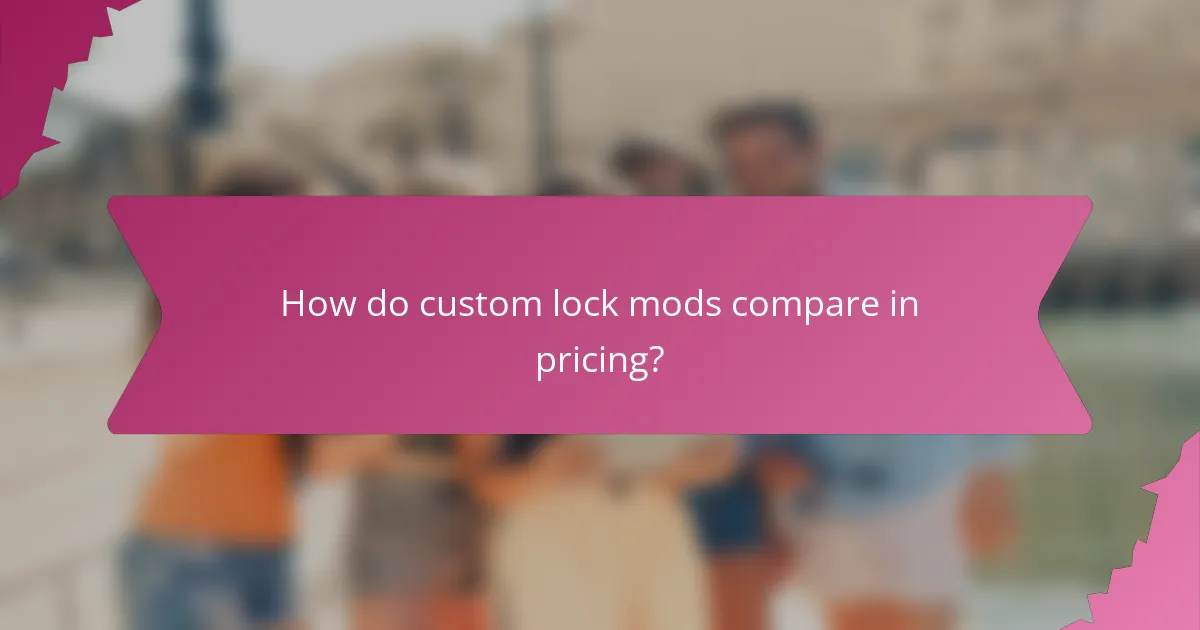
How do custom lock mods compare in pricing?
Custom lock modifications vary widely in pricing, typically ranging from budget-friendly options around $50 to premium models that can exceed $300. When considering the cost, it’s essential to factor in features, installation complexity, and compatibility with smart home systems.
Budget-friendly options
Budget-friendly custom lock mods generally cost between $50 and $150. These options often include basic smart features such as remote access and smartphone compatibility but may lack advanced security protocols. Brands like August and Wyze offer reliable models that fit within this price range.
When selecting a budget option, ensure it meets your specific needs, such as compatibility with existing smart home devices. Look for user reviews to gauge reliability and ease of installation, as some models may require more technical know-how than others.
Premium models with advanced features
Premium custom lock mods typically range from $200 to $400, offering advanced features like biometric access, integrated security cameras, and enhanced encryption. Brands such as Schlage and Yale provide high-end models that not only enhance security but also integrate seamlessly with various smart home ecosystems.
Investing in a premium model can provide peace of mind with features like real-time alerts and remote monitoring. However, consider the installation process, as some high-tech locks may require professional installation, which can add to the overall cost. Always check compatibility with your existing smart home setup to maximize functionality.

What are the security benefits of custom lock mods?
Custom lock mods enhance security by integrating advanced technologies that improve access control and monitoring. These modifications can include features like encryption and activity tracking, which significantly reduce the risk of unauthorized access.
Enhanced encryption protocols
Custom lock mods often utilize advanced encryption protocols to secure communication between the lock and connected devices. This means that even if someone intercepts the signal, they cannot easily decipher the information being transmitted.
When choosing a lock mod, look for those that comply with industry standards such as AES (Advanced Encryption Standard) or TLS (Transport Layer Security). These protocols are widely recognized for their robustness and can provide peace of mind regarding your home’s security.
Activity monitoring features
Many custom lock mods come equipped with activity monitoring features that allow homeowners to track who enters and exits their property. This can include logs of access times and notifications for any unauthorized attempts to unlock the door.
Consider locks that offer real-time alerts via a smartphone app, enabling you to respond quickly to any suspicious activity. Additionally, some systems allow you to set temporary access codes for guests, which can be revoked easily, adding another layer of security.
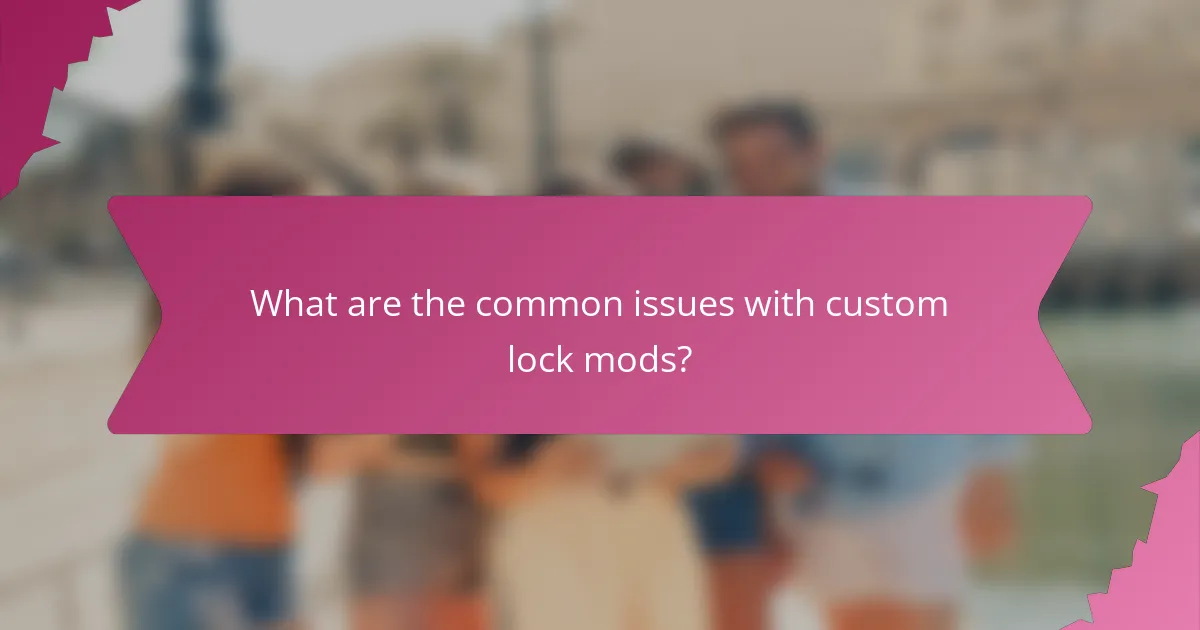
What are the common issues with custom lock mods?
Common issues with custom lock mods include connectivity problems, installation challenges, and functionality limitations. Understanding these issues can help users make informed decisions and enhance their smart home experience.
Connectivity problems
Connectivity problems are a frequent issue with custom lock mods, often stemming from weak Wi-Fi signals or compatibility with smart home systems. Users may experience delays or failures in remote access, which can compromise security and convenience.
To mitigate connectivity issues, ensure that the lock is within range of the Wi-Fi router and that the router supports the lock’s communication protocols, such as Zigbee or Z-Wave. Regularly updating the lock’s firmware can also enhance connectivity and performance.
If problems persist, consider using a Wi-Fi extender or a dedicated hub to improve signal strength. Checking for interference from other devices can also help maintain a stable connection.
